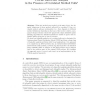Free Online Productivity Tools
i2Speak
i2Symbol
i2OCR
iTex2Img
iWeb2Print
iWeb2Shot
i2Type
iPdf2Split
iPdf2Merge
i2Bopomofo
i2Arabic
i2Style
i2Image
i2PDF
iLatex2Rtf
Sci2ools
231
Voted
SAS
2015
Springer
2015
Springer
Precise Data Flow Analysis in the Presence of Correlated Method Calls
Abstract. When two methods are invoked on the same object, the dispatch behaviours of these method calls will be correlated. If two correlated method calls are polymorphic (i.e., they dispatch to different method definitions depending on the type of the receiver object), a program’s interprocedural control flow graph will contain infeasible paths. Existing algorithms for data-flow analysis are unable to ignore such infeasible paths, giving rise to loss of precision. We show how infeasible paths due to correlated calls can be eliminated for Interprocedural Finite Distributive Subset (IFDS) problems, a large class of data-flow analysis problems with broad applications. Our approach is to transform an IFDS problem into an Interprocedural Distributive Environment (IDE) problem, in which edge functions filter out data flow along infeasible paths. A solution to this IDE problem can be mapped back to the solution space of the original IFDS problem. We formalize the approach, prove it...
Related Content
| Added | 17 Apr 2016 |
| Updated | 17 Apr 2016 |
| Type | Journal |
| Year | 2015 |
| Where | SAS |
| Authors | Marianna Rapoport, Ondrej Lhoták, Frank Tip |
Comments (0)

